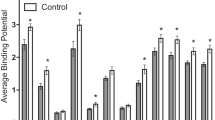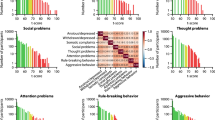Abstract
We and others have previously shown that the dopamine D4 exon III repeat (D4DR) and the serotonin-transporter promoter region (5-HTTLPR) polymorphisms are not only associated with adult personality traits1–7 but also with temperament in 2-week-old neonates.8 We now report the results of a second study of these infants and their temperament at 2 months using Rothbart's Infant Behavior Questionnaire (IBQ).9 There were significant negative correlations between neonatal orientation and motor organization as measured by the Neonatal Behavioral Assessment Scale (NBAS)10 at 2 weeks and negative emotionality, especially distress in daily situations, at 2 months of age. There were significant main effects for negative emotionality and distress when the infants were grouped by the D4DR and the 5-HTTLPR polymorphisms. Infants with long D4DR alleles had significantly lower scores on Negative Emotionality (F[1,72] = 8.50, P = 0.005) and Distress to Limitations (F[1,72] = 4.93, P = 0.03) than infants with short D4DR alleles. In contrast, infants with the short homozygous (s/s) 5-HTTLPR genotype had higher scores on Negative Emotionality (F[1,72] = 3.88, P = 0.053) and Distress to Limitations (F[1,72] = 4.94, P = 0.029) than infants with the I/s or I/I genotypes. The strongest effects occurred in those infants with the s/s 5-HTTLPR polymorphism who also were lacking long D4DR alleles which in some studies has been linked to adult novelty seeking.1,6 These infants showed most negative emotionality and most distress to daily situations, temperament traits that are perhaps the underpinning of adult neuroticism.
This is a preview of subscription content, access via your institution
Access options
Subscribe to this journal
Receive 12 print issues and online access
$259.00 per year
only $21.58 per issue
Buy this article
- Purchase on Springer Link
- Instant access to full article PDF
Prices may be subject to local taxes which are calculated during checkout
Similar content being viewed by others
Author information
Authors and Affiliations
Corresponding author
Rights and permissions
About this article
Cite this article
Auerbach, J., Geller, V., Lezer, S. et al. Dopamine D4 receptor (D4DR) and serotonin transporter promoter (5-HTTLPR) polymorphisms in the determination of temperament in 2-month-old infants. Mol Psychiatry 4, 369–373 (1999). https://doi.org/10.1038/sj.mp.4000531
Received:
Revised:
Accepted:
Published:
Issue Date:
DOI: https://doi.org/10.1038/sj.mp.4000531
Keywords
This article is cited by
-
Serotonin 5-HT1A Receptors as Targets for Agents to Treat Psychiatric Disorders: Rationale and Current Status of Research
CNS Drugs (2013)
-
Serotonin transporter gene polymorphism (5-HTTLPR), environmental conditions, and developing negative emotionality and fear in early childhood
Journal of Neural Transmission (2009)
-
The Serotonin Transporter: Sequence Variation in Macaca fascicularis and its Relationship to Dominance
Behavior Genetics (2007)
-
The molecular genetic architecture of human personality: beyond self-report questionnaires
Molecular Psychiatry (2006)



